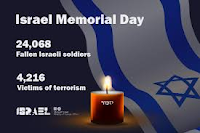 |
| Dor Turgeman - Israel U20 Team |
Israeli national soccer teams face some exceptional hurdles in world tournaments. The Arab countries (and some other Muslim countries) refuse to play against Israel and FIFA (the international governing body of "Futbal" (soccer) more or less goes along. Since 1974, Israel has been forced to compete against European teams in a crowded, extremely competitive division instead of being able to qualify by playing against its neighbours. In short, it is very difficult for Israel to even qualify for world cup soccer tournaments, let alone advance. Israel has only been in the FIFA World Cup once - in 1970. That year, Israel qualified as an Asian team. They lost to Uruguay 2-0, tied Italy 0-0 and tied Sweden 1-1. That record of one loss and two draws was not enough to enable Israel to advance to the knockout stage. Since then, Israel has failed to qualify in 13 attempts - against European competitors.
This 2023 tournament is a bit different - it is only for players under 20 years old - the future stars of soccer, rather than the biggest stars. Of course, Israel had to play hard - and really well - to qualify. In fact, the tournament was originally scheduled to be held in Indonesia. The Indonesians assumed that Israel would not qualify. Once it became clear that Israel would qualify, Indonesia announced that it would refuse to permit the Israeli team to play in Indonesia. So FIFA moved the tournament to Argentina.
At the tournament, Israel's play has been stellar. They beat Japan with moments to go in the round robin section of the tournament to secure a spot in the knockout round. Then they beat Uzbekistan in the round of 16 (1-0) to advance to the quarter finals. Their next opponent was Brazil - a world soccer titan. In a miraculous win, this past Saturday afternoon, Israel outscored Brazil 3-2 in overtime and will now play Uruguay in the semi finals.
Two members of the Israel squad have each scored two goals - Dor Turgeman and Anan Khalaili.
 |
| Anan Khalaili |
Turgeman is 19 years old and was born in Ashdod, Israel. He is exciting to watch and happy to try all kinds of fancy footwork. Anon Khalaili is an Israeli from Sakhnin, Israel. He has also played extremely well and has scored two very exciting and timely goals. Both players are hoping to come up with some even bigger goals in an effort to propel the team to a win over Uruguay.
Personally, I am not normally a huge soccer fan, as you might know. I enjoy watching the big tournaments - the World Cup, the European Championships - and maybe some of the Champions League games. But regular season soccer games can often end in a 0-0 tie. To quote my dad - that can sometimes be as exciting as watching "paint dry."
But my year as a sports fan and spectator has fizzled dramatically. The Buffalo Bills went down with a thud, despite all of the high expectations. The Maple Leafs managed to win a round but then exited in rather pedestrian fashion against the Florida Panthers in the second round of the NHL playoffs. The Raptors were nowhere to be found in the playoffs. The Blue Jays are doing reasonably well but it's early in the season and it seems like they still have 300 games left to play. So not that much for me to cheer about, overall.
In fact, this U20 FIFA tournament was not even on my radar as an event to watch.
But when I saw that the Israeli squad had eked out a victory over Japan - I definitely became interested in watching the Israel-Uzbekistan match. I have to say, I felt little doubt that they would beat the Uzbekkies but it turned out to be a much closer match than I expected.
Against Brazil - well - I was just hoping it wouldn't be ugly or embarrassing. Sure, we were all dreaming of an Israeli win - but no one really predicted that Israel would be beat Brazil.
So here we are - all set for tomorrow and I will definitely be glued to the TV, watching with a VPN before heading back to Israel next week. The Uruguay team looked very solid against a strong American side on Sunday and will present quite a challenge. But given that Israel managed to beat Brazil, you have to think that anything can happen.
Stay tuned and if you have the chance - try to watch the big game. Back to regular scheduled programming shortly - political commentary, winery reviews and other random ruminations - not necessarily flowing together smoothly. Since I will be back in Israel, I am sure I will have a variety of topics to write about. For today, on this historic semi-final eve, it had to be soccer, soccer and soccer.
Go Israel!!!
